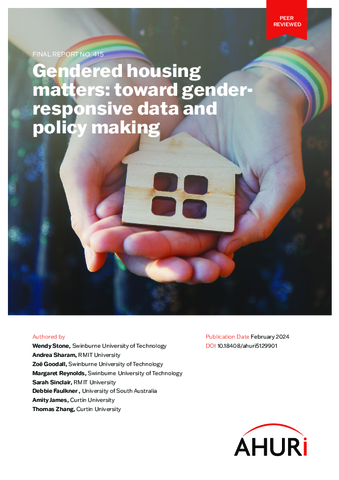With peoples’ gender having a real impact of their ability to find safe, affordable housing, new AHURI research highlights that policy makers and support services need to develop secure and accurate data collection and collation practices in order to improve outcomes. It is critically important that researchers can provide confidence to participants and end-users that gender-related data will be gathered respectfully, treated securely, stored securely and used only for legitimate evidence and policy purposes.
This research presents evidence that housing opportunities, pathways, assistance and impacts are gendered. This is particularly the case when the often co-existing and cumulative lifetime impacts of educational attainment, critical life events, family formation and/or relationship dissolution are included in the analysis. For example, for people aged 18—34, there is only a marginal difference in housing precarity (i.e. the condition of having unstable or insecure housing that does not meet adequate standards of affordability, quality or security) experienced overall between male and female respondents; however, for lone parents, 10.4 per cent of lone fathers are in a precarious housing situation while 14.6 per cent of lone mothers experience precarity—a reflection of the gendered nature of housing precarity.
The research also developed the Gendered Housing Framework through which gender-responsiveness can be assessed in housing and homelessness policy and practice, including data adequacy in census, survey and administrative data collections.


